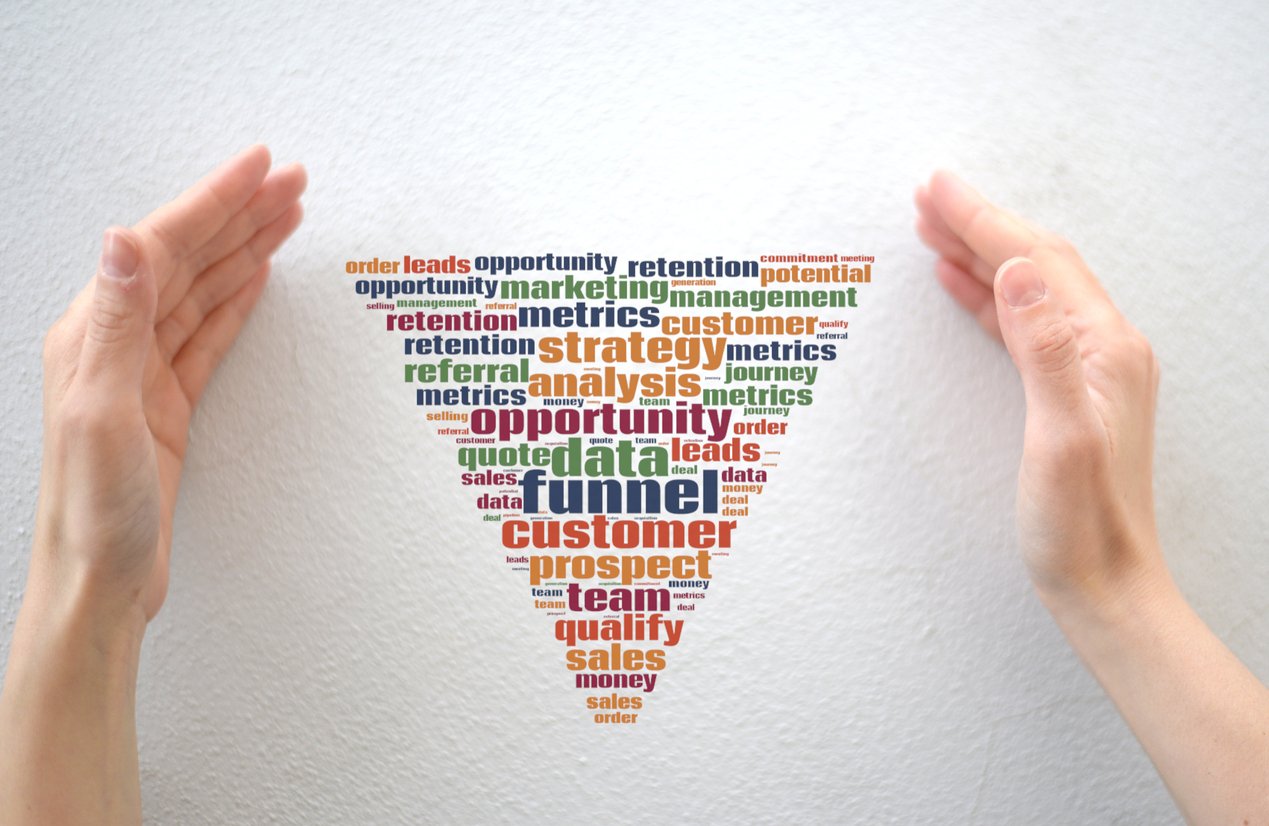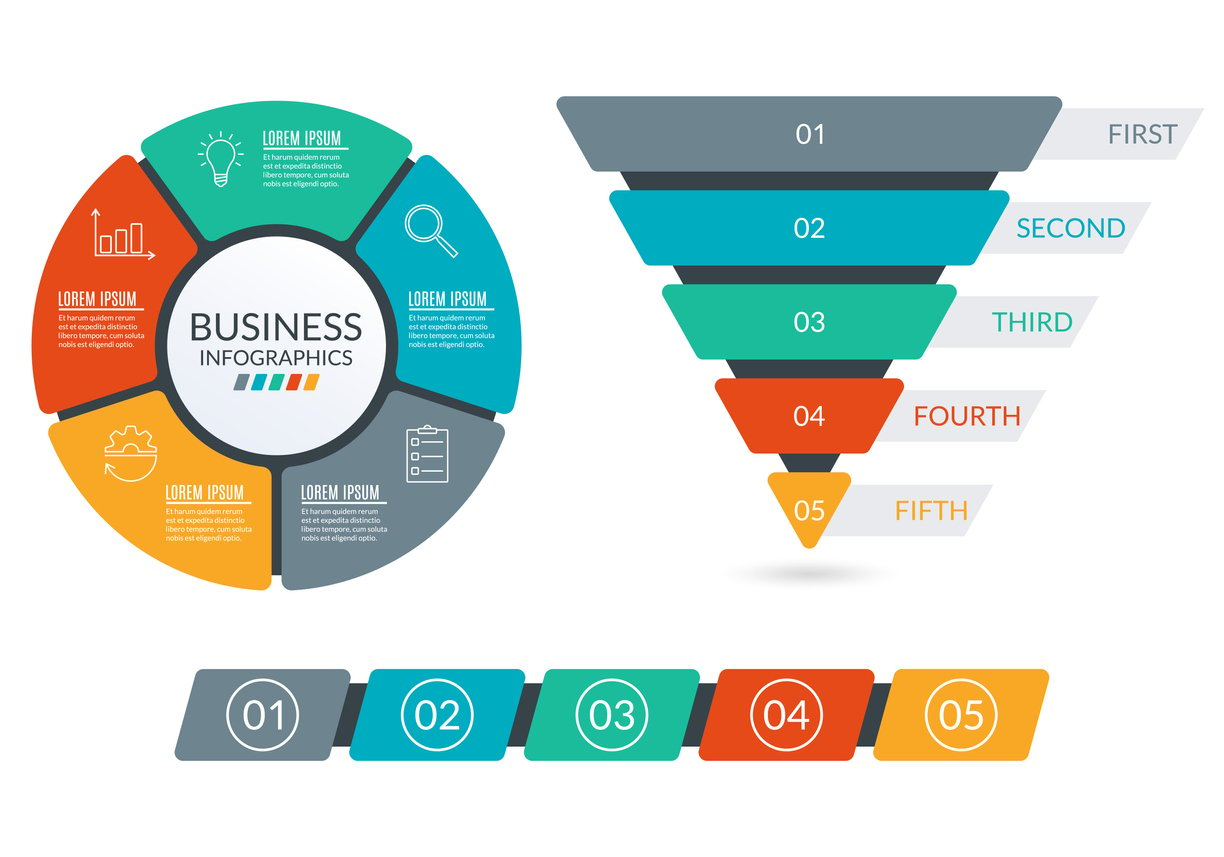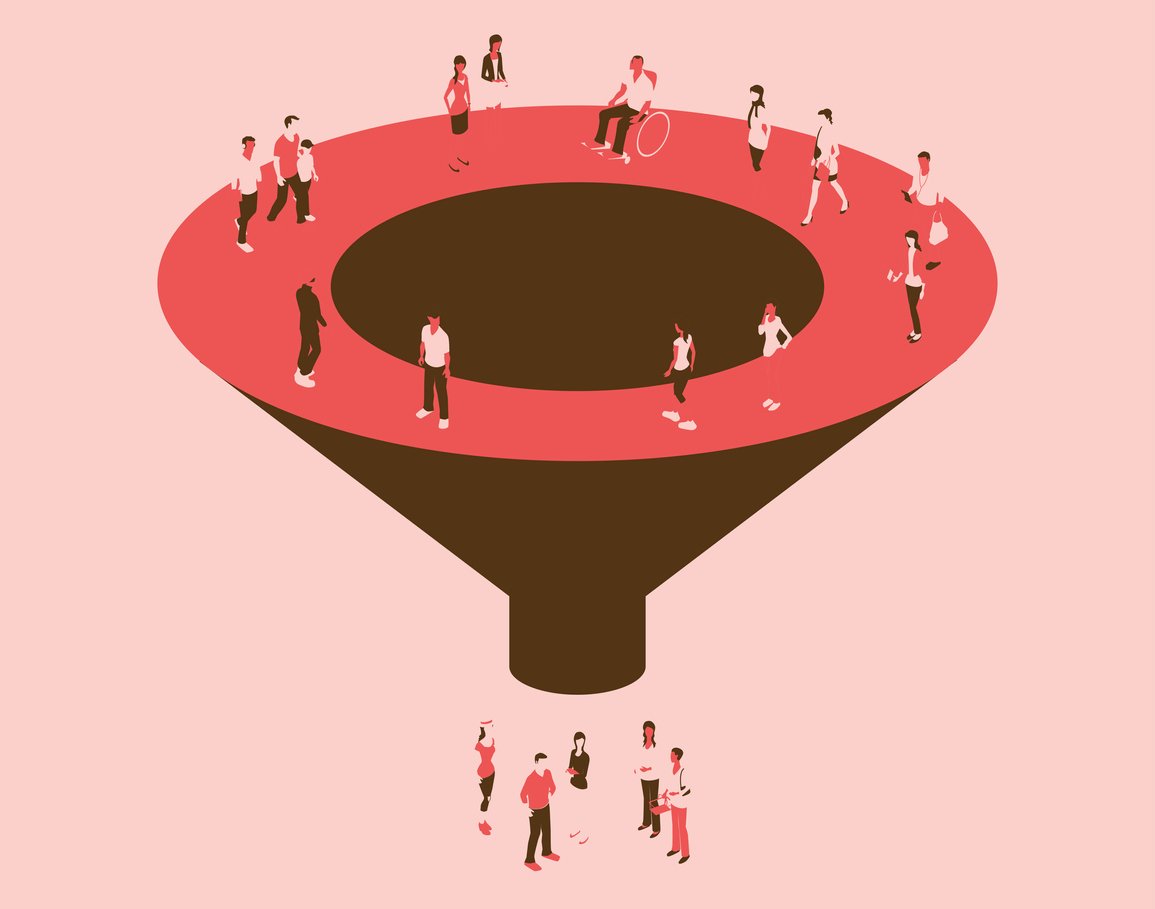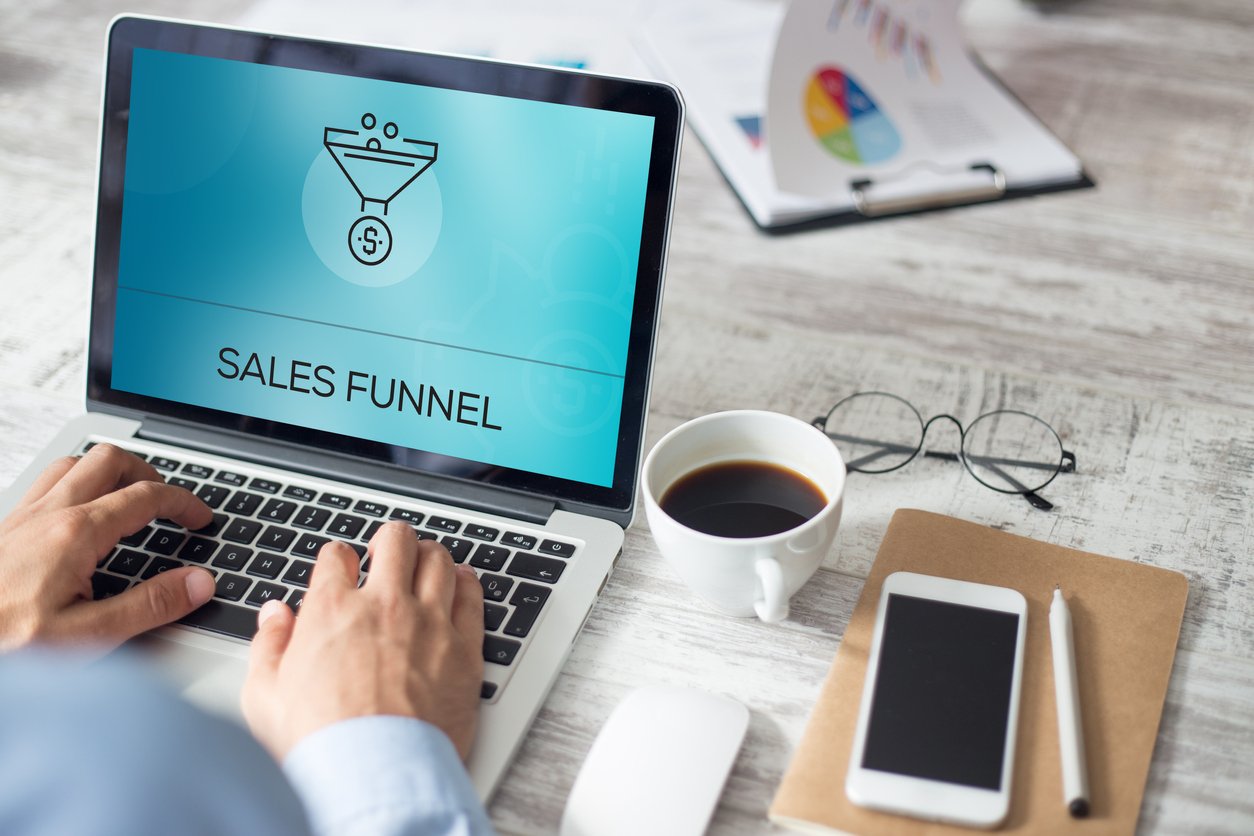
Sales Pipeline Funnel: A Comprehensive Guide
 Updated on
Updated on
 By Carlos Correa
By Carlos Correa
Carlos Correa
Carlos has been involved in the sales space for well over ten years. He began in the insurance space as an individual sales agent, managing teams as s...
learn more
Carlos Correa
Carlos has been involved in the sales space for well over ten years. He began in the insurance space as an individual sales agent, managing teams as s...
Table of Contents
Table of Contents
You've probably heard the term sales pipeline funnel thrown around quite often, especially in the ever-changing sales landscape.
Imagine a funnel, not for pouring drinks, but for serving prospects with a side of charm and a dash of strategy. It's like making a gourmet sandwich – you need the right ingredients layered in just the correct order. But instead of lettuce and bacon, we're talking about follow-ups, negotiations, and personalized communication.
In this article, we're exploring the primary differences between a sales funnel vs a sales pipeline, give examples of what each does, and showcase how our software, Ringy, improves the sales process and, ultimately, your sales pipeline funnel.
What Is a Sales Pipeline?

Sales pipelines guide prospective customers through various stages, from initial interest to becoming paying clients. Internally managed by sales teams, these pipelines track progression through stages like prospecting, qualification, consideration, decision, and closing.
Here are six key stages of the average sales pipeline:
- Lead Generation: Collaborative efforts between sales and marketing teams to discover and attract potential customers using PPC advertising, referrals, email marketing, SEO, cold calling, and social media prospecting.
- Qualification: Sales teams assess sourced prospects to determine their fit for the product or service, asking questions about their business's needs, budget, and previous solutions.
- Meeting/Demonstration: After qualification, salespersons showcase the product/service in detail, discuss solutions, and begin crafting a business proposal if the prospect expresses interest.
- Proposal: If the prospect agrees, a proposal is sent, including details like price, contract length, terms, and service levels.
- Deal Closure or Loss: Financial negotiations follow proposal acceptance. If the contract is signed, the prospect becomes a customer. If declined, the salesperson may revisit the prospect in the future.
- Retention: Often overlooked but crucial, this stage focuses on customer loyalty and retention, transitioning responsibility from sales to customer service/client services teams.
While sales pipelines traditionally emphasize the path to acquiring customers, retention at the final stage is equally vital for long-term success.
Why Is a Sales Pipeline Important?
A sales pipeline is vital for streamlining the sales process and ensuring its success. It provides a structured framework, offering clear visibility into the progress of leads through various stages. This visibility aids effective:
- Planning
- Resource allocation
- Prioritization of leads
Additionally, the pipeline facilitates accurate sales forecasting, goal setting, and continuous improvement by adapting to changing market conditions. With the help of a CRM system, sales pipelines can enhance communication and collaboration within your sales team.
What Is a Sales Funnel?

A sales funnel and a sales pipeline share similarities but differ in focus. While a sales pipeline is business-oriented, a sales funnel centers on the customer's journey toward purchasing.
Like the spin sales model, it categorizes stages based on a preconceived idea of the prospect's thought process, allowing marketing teams to customize their strategies accordingly.
Let's look at the different stages of the sales funnel pipeline.
|
Stage |
Description |
|
Awareness |
Prospects become aware of a product or service, seeking solutions to a specific problem through sources such as online searches, word of mouth, reviews, or social media. |
|
Interest |
Prospects show interest in specific solutions, shortlisting options and seeking more information about potential resolutions to their problem. |
|
Consideration |
Extensive research is conducted, with prospects actively considering various solutions. They delve into specific features, pricing, testimonials, and reviews to make informed decisions. |
|
Decision |
Prospects, having evaluated solutions in detail, reach the decision stage, selecting the best solution that aligns with their needs. |
Understanding the stage a prospect is in helps marketing teams tailor their approach effectively.
The sales funnel provides a customer-centric perspective on the purchasing journey. By recognizing the prospect's awareness and intent, marketers can strategically guide them through stages, leading to informed decision-making and higher conversion rates.
Why Is a Sales Funnel Important?
A sales funnel is indispensable for businesses as it shifts the focus to a customer-centric approach, mapping the journey from awareness to decision. This enables tailored marketing strategies, ensuring efforts are concentrated on leads with higher conversion potential or that present upsell opportunities.
The efficient allocation of resources, improved conversion rates, and clear visibility into the buyer's mind contribute to:
- Strategic decision-making
- Fostering customer retention
- Facilitating accurate sales forecasting
Ultimately, a well-structured sales funnel allows you to navigate the complexities of customer interactions, enhancing your organization's overall effectiveness and long-term success.
Sales Pipeline Vs. Sales Funnel

We've learned that sales pipeline funnels are essential in the business vertical, but to make things easier, here's a table summarizing the key differences.
|
Aspect |
Sales Pipeline |
Sales Funnel |
|
Focus |
Business-Oriented |
Customer-Centric |
|
Representation |
Internal stages of the sales process, tracking progress from lead to customer |
External view of the customer journey, emphasizing stages of awareness and purchasing intent |
|
Purpose |
Guides sales teams in managing and closing deals efficiently |
Tailors marketing strategies based on the customer's journey, from awareness to decision |
|
Stages |
Typically includes prospecting, qualification, consideration, decision, and close |
Comprises awareness, interest, consideration, and decision stages, aligning with the customer's mindset |
|
Adaptability |
Primarily reflects the company's sales process |
Adapts to changes in customer behavior, market trends, and marketing approaches |
|
Resource Allocation |
Helps allocate resources efficiently within the sales team |
Guides marketing teams in focusing efforts on leads with higher conversion potential |
|
Visibility |
Provides a clear view of where each deal stands in the sales process |
Offers insights into the customer's decision-making process, aiding in strategic planning |
|
Outcome |
Primarily aimed at deal closure and revenue generation |
Focuses on building relationships, improving customer satisfaction, and long-term success |
Both play crucial roles, with the pipeline ensuring efficiency in closing deals, and the funnel guiding marketing strategies to meet customer needs (otherwise known as needs based selling) effectively. Understanding the nuances of both concepts is essential if you're seeking to optimize your sales and marketing approach.
Do I Need a Sales Pipeline or a Sales Funnel?
Determining whether to implement a sales pipeline, a sales funnel, or a combination of both is critical in optimizing your sales strategy. The decision hinges on the unique requirements of your sales process.
In scenarios where your brand deals with high-value products necessitating a nuanced and intricate buying journey, a well-structured sales pipeline proves invaluable. This visual representation not only aids new sales representatives in swiftly grasping your sales strategy but also facilitates tracking opportunities that may involve extended timelines for progression.
Conversely, if your company operates in a B2C space or follows a shorter B2B sales cycle (alternatively, if your organization deals with more complex cycles, try out the Miller Heiman sales process), a sales funnel might align more seamlessly with your team's dynamics. Emphasizing conversion rates within each funnel stage is paramount. This approach lets team members:
- Pinpoint and rectify issues
- Establish quantifiable success KPIs for sales at every funnel stage
- Maintain a high level of customer engagement
Consider, for instance, a situation where there's a noticeable drop in conversion from the lead qualification stage to the proposal stage. This prompts a thorough review of the lead qualification process to identify and rectify potential inefficiencies.
On the other hand, challenges in securing meetings with sales-qualified leads may necessitate adjustments to your sales qualification criteria.
Integrating activities such as content marketing can prove instrumental in enhancing and diversifying your efforts. By driving more qualified leads into your sales pipeline funnel, you move away from generic prospecting and deliberately bolster your sales strategy.
How Ringy Improves Your Sales Process

Now that you know the difference between a sales funnel and sales pipeline, it's time to get to the juicy stuff. How Ringy improves your sales pipeline funnel and processes.
Our robust platform introduces a paradigm shift in customer relationship management tools, redefining the dynamics of sales progress tracking, prospect engagement, lead qualification, efficient lead assignment, and sales pipeline management.
Advanced Sales Progress Tracking
Ringy's CRM sales software introduces an advanced and intuitive approach to sales pipeline funnel progress tracking, setting it apart from other customer relationship management tools. In the intricacies of business expansion, this feature arises as a beacon, guiding organizations through the complexities of scaling operations. With a focus on real-time monitoring, Ringy ensures that your organization stays agile and responsive, adapting to evolving market demands.
As your company grows, the ability to monitor individual and team performance becomes paramount. Ringy provides an expansive dashboard that offers profound insights and reports about the sales funnel, enabling leaders to identify trends, forecast outcomes, and make data-driven decisions. This feature proves instrumental in creating a culture of accountability, where achievements are recognized, and challenges are proactively addressed.
In employee retention, Ringy's sales progress tracking becomes a strategic tool. Recognizing and rewarding top performers is not just a luxury; it's a necessity. The software facilitates the identification of high achievers, allowing organizations to acknowledge and appreciate their efforts. By assisting in fostering a culture of recognition, Ringy actively contributes to reducing turnover rates, ensuring helpful team members feel valued and motivated.
Effortless Prospect Engagement with Automation
Ringy's automation features redefine the dynamics of prospect engagement. As you strive for efficiency and effectiveness, these features act as a backbone for streamlining repetitive tasks and enhancing the overall productivity of your sales team. Imagine a world where your sales representatives are freed from the shackles of routine operations, allowing them to invest more time building meaningful connections with prospects.
The heart of Ringy's automation lies in its ability to orchestrate dynamic drip campaigns. These campaigns are not mere sequences of generic messages but finely crafted, personalized interactions that nurture leads from initial contact to conversion. Through targeted emails, SMSs, and calls, Ringy ensures that leads are pursued and actively engaged, creating a sense of connection beyond transactional exchanges.
Moreover, the system's capacity to automate follow-ups contributes significantly to sustained prospect engagement. It eliminates the risk of crucial touchpoints slipping through the cracks, ensuring that leads are consistently nurtured until they reach the point of conversion readiness. This level of automation transforms sales representatives into relationship builders, allowing them to focus on the nuances of individual customer journeys.
Swift and Smart Lead Qualification
Ringy's lead qualification tools represent a leap forward in the science of identifying high-potential leads. In the competitive arena of sales, where every moment counts, these tools provide organizations with a strategic advantage. The streamlined lead qualification process ensures that sales teams invest their energy in pursuits with the highest likelihood of success.
The intelligent lead-scoring system within Ringy's CRM is a game-changer. It goes beyond the conventional metrics, considering factors such as engagement levels, budget considerations, and buying intent. By incorporating these nuanced elements, Ringy ensures that the prioritization of leads aligns seamlessly with your broader business goals. This level of sophistication allows your organization to personalize its approach to individual leads, delivering a personalized experience that resonates.
The efficiency gains from swift and smart lead qualification extend beyond immediate conversions. They contribute to the overall health of the sales pipeline funnel, preventing the accumulation of unqualified leads that could drain resources without yielding commensurate results. Ringy's ability to help you focus on high-quality leads is not just about immediate wins; it's a strategic investment in long-term success.
Efficient Lead Assignment with AI Precision
In the complex sales landscape, the efficient assignment of leads to the right sales representatives is a critical determinant of success. Ringy's one-click lead assignment feature, powered by artificial intelligence (AI) recommendations, represents a pinnacle of precision in this domain. It's not merely about expediting the process; it's about ensuring that each lead is matched with a professional possessing the expertise, experience, and track record of success necessary to navigate the intricacies of the sales journey.
Consider the traditional challenges of lead assignment. The manual process often involves a series of decisions based on workload, expertise, and other factors. However, as the business scales, this becomes a logistical puzzle with increasingly complex dimensions. Ringy's AI-driven approach simplifies this puzzle, providing instantaneous recommendations that optimize the pairing of leads and representatives.
The benefits of efficient lead assignment ripple across multiple facets of the sales operation. It minimizes the risk of leads languishing in an unattended state, waiting for assignment. Instead, it ensures that each lead receives prompt attention from a professional equipped to handle their specific needs. This expedites the sales cycle while enhancing the overall customer experience, laying the groundwork for sustained relationships.
Dynamic Sales Pipeline Management
Ringy's approach to sales pipeline funnel management transcends the conventional, offering organizations a dynamic and comprehensive view of their entire sales vertical. This panoramic perspective is not just about monitoring progress; it's about empowering leaders to make strategic adjustments on the fly, ensuring that the sales operation remains agile and responsive.
A clear, real-time view of the sales pipeline is the cornerstone of Ringy's approach. It goes beyond static spreadsheets, providing a dynamic dashboard visualizing the customer journey. Leaders can track progress, identify bottlenecks, and gain insights into the effectiveness of each stage within the sales funnel. This level of transparency is indispensable in a business environment where agility is synonymous with competitiveness.
The ability to identify bottlenecks in real-time is a strategic advantage. It allows organizations to address issues promptly, preventing potential disruptions in the sales process. Whether it's a lead conversion slowdown or opportunities management challenges, Ringy's dynamic sales pipeline management enables leaders to diagnose issues swiftly and implement targeted solutions.
Moreover, the system's adaptability is a key feature. As market dynamics evolve and business strategies shift, the ability to make adjustments on the fly becomes invaluable. Ringy's robust sales pipeline management facilitates this adaptability, providing leaders with the tools to tweak strategies, optimize processes, and align the sales operation with broader organizational goals.
Final Thoughts - Sales Pipeline Funnel
Now you've got the gist of the difference between a sales funnel and pipeline, we're excited to end this blog post positively.
In a world where businesses seek comprehensive solutions to streamline operations, Ringy stands out as the all-in-one answer to manage all sales pipeline funnel nuances. It's not just a tool; it's a partner that gives organizations the tools to optimize every facet of their sales process.
Ready to transform your sales process and elevate your business?
Request a demo to find out more!

Skyrocket your sales with the CRM that does it all.
Calling? Check. SMS? Check. Automation and AI? Check. Effortlessly keep in touch with your customers and boost your revenue without limits.

Take your sales to new heights with Ringy.
Sales in a slump? Ringy gives you the tools and flexibility you need to capture leads, engage with them, and turn them into customers.
Subscribe to Our Blog
Enter your email to get the latest updates sent straight to your inbox!
Categories
Related Articles




































































































